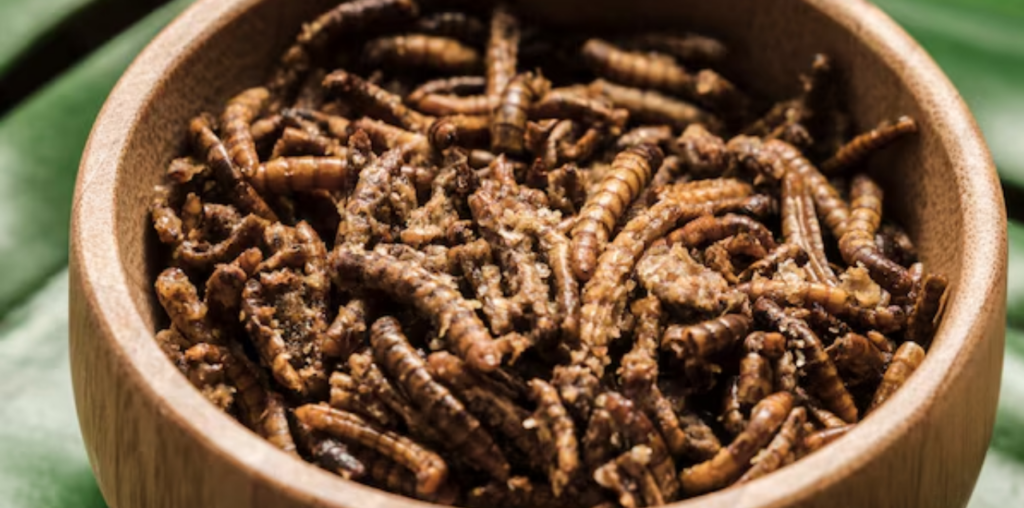As a loving pet owner, you want the best for your baby bearded dragon, but feeding them the right food can be confusing. You might worry about choosing the wrong foods or feeding too much.
Live mealworms for sale are a popular choice, but they can be tricky. If you give your baby dragon too many, they could gain weight or have trouble digesting them. Plus, the right size is important, as too big of a mealworm could be hard for your dragon to eat.
So, here, we will help you safely feed mealworms to your baby bearded dragon, ensuring they grow up healthy and strong.
Understanding Mealworms
Mealworms are the larvae of the mealworm beetle, and they are a nutritious food source for reptiles like bearded dragons. In fact, mealworms are high in protein and fats, which makes them a great option for helping your baby bearded dragon grow and gain strength.
However, they also contain a high level of fat, so they must be fed in moderation, especially to babies. It’s important to know the right amount and method for feeding them to avoid overfeeding or causing obesity.
1. Choose the Right Size Mealworms
When feeding mealworms to your baby bearded dragon, size matters. Baby bearded dragons have smaller mouths, and larger mealworms could pose a choking hazard or be difficult for them to digest.
Opt for smaller mealworms, which are easier for your pet to handle. You can find mealworms in various sizes, so look for small mealworms that are appropriate for their age and size.
2. Gut-Load Your Mealworms
Gut-loading is a process where you feed the mealworms nutritious food before giving them to your bearded dragon. Mealworms eat a variety of foods like carrots, oats, and leafy greens.
By feeding them these nutritious options, the mealworms themselves become more nutritious. This way, when your baby bearded dragon eats them, they’re also consuming the beneficial nutrients that were in the mealworm’s diet.
3. Dust the Mealworms with Calcium Powder
Baby bearded dragons need a lot of calcium for healthy bone growth. While mealworms provide protein, they don’t offer much calcium.
To ensure your baby gets enough calcium, lightly dust the mealworms with a calcium supplement before feeding them. This simple step helps prevent calcium deficiency and ensures strong, healthy bones.
4. Feed Mealworms in Moderation
Although mealworms are rich in nutrients, they should only be fed in moderation. Overfeeding mealworms, which are high in fat, can lead to obesity in your baby bearded dragon.
A healthy diet for a baby bearded dragon should consist of a variety of foods, with mealworms as a treat or occasional main dish. Consider offering other insects like crickets, along with leafy greens to maintain a well-rounded diet.
5. Remove Leftover Mealworms
If your baby bearded dragon doesn’t finish all the mealworms, remove the leftovers after about 15-20 minutes.
This helps prevent uneaten mealworms from becoming a breeding ground for bacteria, which could make your pet sick. Keeping the feeding area clean also ensures a healthier living environment for your dragon.
6. Observe for Any Digestive Issues
After feeding your baby bearded dragon mealworms, always observe their behavior and digestion. If your dragon seems sluggish, bloated or shows any signs of discomfort, it could be due to improper feeding.
In such cases, it’s best to reduce the number of mealworms and focus on providing other nutritious food options. Always consult with a vet if you notice any unusual behavior after meals.
7. Where to Buy Live Mealworms for Sale
If you’re looking for live mealworms for sale, it’s important to buy from a trusted source. Look for reliable pet stores or online suppliers who specialize in feeding insects for reptiles.
The quality of the mealworms matters as some sellers may offer poorly cared-for insects that could have harmful bacteria or parasites. Always choose a reputable seller to ensure that your baby bearded dragon gets safe, healthy mealworms.
When purchasing live mealworms, it’s also a good idea to buy in bulk if you plan to feed them regularly. Just remember to store them properly in a cool, dry place to maintain their freshness.
Conclusion
Feeding your baby bearded dragon mealworms is a great way to provide them with essential nutrients. However, it’s important to do so safely and in moderation.
By choosing the right size mealworms, gut-loading them, dusting them with calcium, and offering them as part of a balanced diet, you can ensure your baby dragon stays healthy and happy.
Always observe your pet for any signs of discomfort and consult with a vet if needed. With the right care and knowledge, mealworms can be a wonderful addition to your baby bearded dragon’s diet!




